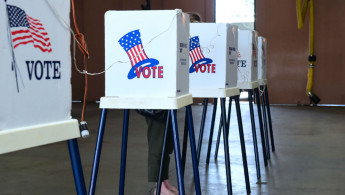Biden’s low approval among US Muslim voters "a challenge" for upcoming midterms
If US President Joe Biden looks like he's in trouble with the average voter in the United States, then there's even worse news for him among Muslim voters.
A new survey of US Muslim voters released Wednesday by the Council on American-Muslim relations has found that, while his approval rating is 41 per cent among the general population of US voters, when focusing on Muslims that figure goes down to 28 per cent.
"I would look at it as a challenge," Corey Saylor, CAIR's research and advocacy director, told The New Arab.
He noted that respondents seemed to express support for the Democratic party. Still, they felt it wasn't getting enough done, as indicated by their much more favourable view of the party (compared with the administration), at 41 per cent.
The survey, conducted online in late May, polled people who opted in for the questionnaire, meaning respondents were probably more likely to be politically active.
The respondents' top issues of domestic concern were gun violence (75.6 per cent), civil rights (71.1 per cent), the economy (70.5 per cent), healthcare access (66.5 per cent), and religious freedom (65.5 per cent). Likely affecting these concerns was the fact that the survey was taken in the wake of the school mass shooting in Uvalde, Texas.
They reported their top Muslim-related foreign policy concerns during the 2022 midterm election cycle as: the Israeli occupation of Palestine (90.5 per cent), Chinese genocide of Uyghur Muslims (87.4 per cent), oppression of Muslims in India (80.8 per cent), Burma genocide of Rohingya Muslims (75.8 per cent), and starvation in Afghanistan (67.4 per cent).
Though the Biden administration has taken steps to address most of these concerns, the view of those surveyed is that not enough is being done.
These results, particularly the administration's low approval rating, says Saylor, mean one of two things: "They need to do more, or they need to tell their story better."
While Muslims' overall view of the Democrats is not high, its view of Republicans is even worse, with only 11.4 per cent of those surveyed wanting them to win control of Congress in November, compared with 66.9 per cent who want Democrats to win. These dismal ratings could give both parties the opportunity to engage a community that does not feel appreciated by the political establishment.
During George W. Bush's 2000 election campaign, prior to 9/11, he won the Muslim vote by engaging with the community. More recently, Republican Glenn Youngkin won the 2021 Virginia governor’s race by enthusiastically engaging with the state's different communities, including Muslims.
Though around half of the Muslims surveyed identified as socially conservative and more than half identified as fiscally conservative, the respondents still expressed much more preference toward the Democrats than the Republicans, possibly a sign that they feel more welcome in Democratic party.
Still, the low approval rating of the administration, and an even lower view of Congress, at 7.8 per cent, show that Muslims' voter enthusiasm and turnout could be low if politicians don’t give them a reason to go out to the polls for the upcoming midterms.
"They're expressing frustration," said Saylor. "It's not unusual, but it would be good to deal with it between now and the midterms. The support is there, but will the turnout be?"





 Follow the Middle East's top stories in English at The New Arab on Google News
Follow the Middle East's top stories in English at The New Arab on Google News


